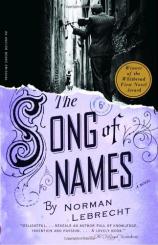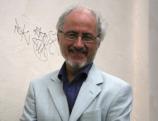Reading Group Guide
Discussion Questions
The Song of Names

1. How does Martin present himself as he begins to narrate his story? Does he attempt to make himself appealing to the reader, or not? Does he win the reader's empathy as his story proceeds?
2. Discuss the difference between Martin's and Dovidl's characters and temperaments. Who takes care of whom, and who takes advantage of whom? How mutually beneficial is their relationship? How is the relationship unequal? How correct is Martin when he thinks, "In truth, I was his dupe. He needed me so much, he made me his prisoner, his emasculated acolyte" [p. 290]?
3. Is Martin, as the son and business heir of a professional music agent, necessarily at odds with Dovidl? Martin says of his father, "His interest in this new boy was evidently commercial. If Flesch was able to groom him, Simmonds would have a star on its hands, our first violinist of world pedigree. The opportunity had its humanitarian side as well, making it morally rewarding. I was being called to do my part as heir to the business, and for the benefit of my spiritual education" [p. 66]. How does this passage indicate Martin's view of his father? Is his father purely ambitious and self-serving, or not?
4. What is the effect of the narrator's description of life in Warsaw's Jewish ghetto, and how does it compare to life in the well-heeled London neighborhood where Dovidl is transplanted? Compare this description to the one later in the novel of the Hasidic quarter in Oldbridge as first seen by Dovidl [pp. 216—18]. How much does a sense of loyalty to his origins account for the choice Dovidl makes when he turns away from a musical career?
5. How powerful is the emotional impact of the scene in which Dovidl hears the Rebbe sing from the "Song of Names" to recover the names and death dates of his family members? How does the logic of the scene, followed by the seven days of shiva, account for the turning point in Dovidl's destiny [pp. 217—25]? If you have read other works of literature that hinge upon a scene of conversion or awakening, how does this compare?
6. How does the novel treat the culture of middle-class Anglo-Jews during the period it depicts? What are the values of Martin's parents? What are the benefits of assimilation? Given Dovidl's embrace of ultra-Orthodox Hassidism, would it be likely for the two men to resume their friendship once they meet again?
7. As a boy, Dovidl comments, "The real world is divided into two classes of humans: those who make things happen and those who let them happen. I belong to the first class" [p. 91]. Later we are told that Spielman and the Rebbe "had relieved him of the unbearable expectations of talent and admitted him to a world where all were equal in the sight of God and subject equally to His eternal laws" [p. 230]. How convincingly does the novel argue for the need of traditional and religious comforts for those who have suffered?
8. What is Martin's attitude toward women throughout the novel? Consider his relationships with his mother, Florrie, his wife Myrtle, Eleanor Stemp, and Sandra Adams. Does the novel suggest that his only true love was for Dovidl, even as Martin denies a homoerotic aspect to their friendship [see pp. 92, 94, 290]?
9. In his teenage years, Dovidl is drawn to the danger and excitement of gambling, sex, and drugs, and Martin suspects him of a frightening amorality. Later, Martin suggests that artists of genius are perhaps in league with the devil: "The greater the musician, the closer he communes with the source of evil" [p. 291]. What insights does the novel provide into the idiosyncrasies of artistic genius and its effects upon those close to the artist?
10. Upon hearing the end of Dovidl's story Martin reflects, "What a man feels in his heart of hearts is inscrutable to the human eye, and therefore immaterial. What counts is his conduct, what he does with his life." Why then does he go on to say, "Now it is time to calculate penalties and methods of repayment" [p. 242; see also 292]? Is Martin's desire to exact payment wrong-headed or understandable? How well does he comprehend the story Dovidl has told him?
11. Given the circumstances of Martin's success after having solved the mystery of Dovidl's disappearance, what comment does Lebrecht seem to make about the realities of life as a promoter of musical talent? What insight does the novel as a whole offer about the realities of the music business?
12. Does Lebrecht indicate which of the two main characters is the novel's hero? Did Dovidl make the right decision in leaving the secular life behind, as he explains himself in his letter to Martin [pp. 305—08], and does his decision make him morally superior to Martin? Or is Martin possibly right in his first reaction to Dovidl's story—that "my susceptible friend was enticed by a fanatical sect" [p. 226]? What philosophy of life does the novel ultimately embrace?
13. Lebrecht creates something of a surprise ending by inserting himself as the character to whom Martin tells his story [pp. 310—11]. Lebrecht thus makes the novel essentially the result of this fictional encounter. What is the effect of this ending? Does Martin do this mainly so that he will be able to sell the Guadagnini violin that belonged to Dovidl?
The Song of Names
- Publication Date: February 10, 2004
- Paperback: 320 pages
- Publisher: Anchor
- ISBN-10: 1400034892
- ISBN-13: 9781400034895








